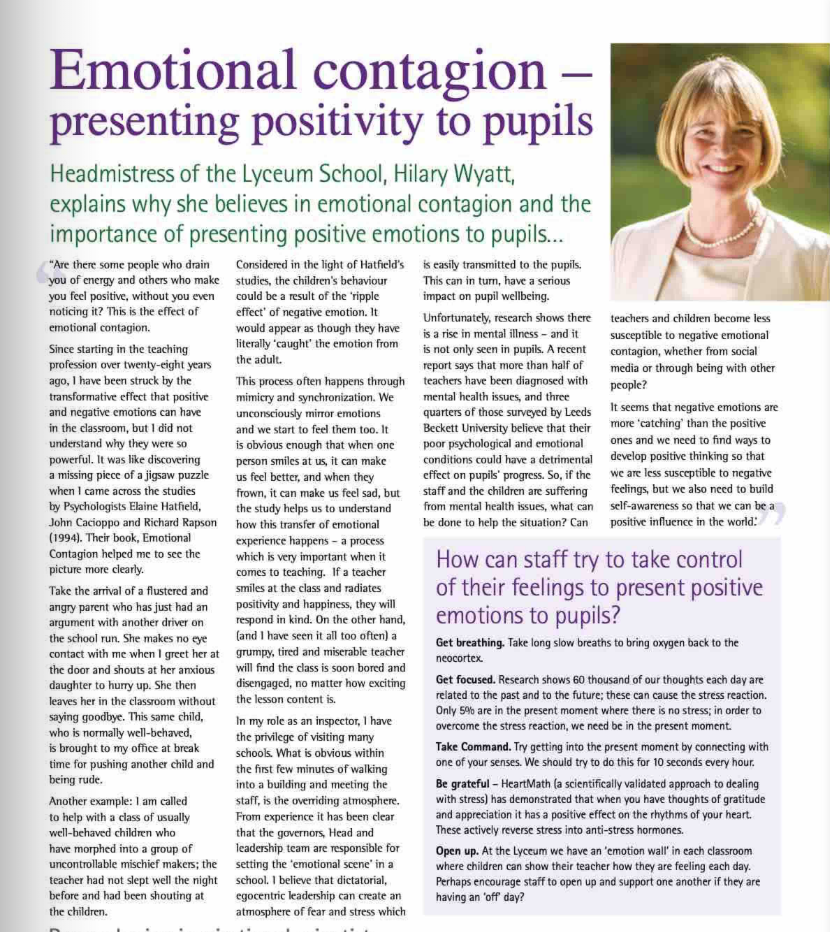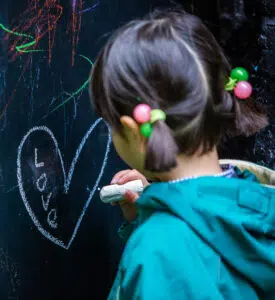Are there some people who drain you of energy and others who make you feel positive, without you even noticing it? This is the effect of emotional contagion.
Since starting in the teaching profession over twenty-eight years ago, I have been struck by the transformative effect that positive and negative emotions can have in the classroom, but I did not understand why they were so powerful. It was like discovering a missing piece of a jigsaw puzzle when I came across the studies by Psychologists Elaine Hatfield, John Cacippo and Richard Rapson (1994). Their book, Emotional Contagion helped me to see the picture more clearly.
Take the arrival of a flustered and angry parent who has just had an argument with another driver on the school run. She makes no eye contact with me when I greet her at the door and shouts at her anxious daughter to hurry up. She then leaves her in the classroom without saying goodbye. This same child, who is normally well-behaved, is brought to my office at break time for pushing another child and being rude.
Another example; I am called to help with a class of usually well-behaved children who have morphed into a group of uncontrollable mischief makers; the teacher had not slept well the night before and had been shouting at the children.
Consider in the light of Hatfield’s studies, the children’s behaviour could be the result of the ‘ripple effect’ of negative emotion. It would appear as though they have literally “caught” the emotion from the adult.
This process often happens through mimicry and synchronization. We unconsciously mirror emotions and we start to feel them too. It is obvious enough that when one person smiles at us, it can make us feel sad, but the study helps us understand how the transfer of emotional experience happens – a process which is very important when it comes to teaching. If a teacher smiles at the class and radiates positivity and happiness, they will respond in kind. On the other hand, (and I have seen it all too often) a grumpy, tired, and miserable teacher who will find the class is soon bored and disengaged no matter how exciting the lesson content is.
In my role as an inspector, I have the privilege of visiting many schools. What is obvious within the first few minutes of walking into a building and meeting the staff, is the overriding atmosphere. From experience, it is has been clear that the governors, Head and leadership team are responsible for setting the “emotional scene” in the school. I believe the dictorial, egocentric leadership can create an atmosphere of fear and stress which is easily transmitted to the pupils. This can, in turn, have a serious impact on pupil wellbeing.
Unfortunately, research shows there is a rise in mental illness – and it is not only seen in pupils. A recent report says that more than half of teachers have been diagnosed with mental health issues, and three-quarters of those surveyed in Leeds Beckett University believe that their poor psychological and emotional conditions could have a detrimental effect on pupils’ progress. So, if the staff and children are suffering from mental health issues, what can be done to help the situation? Can teachers and children become less susceptible to contribute to negative emotional contagion, whether from social media or through being with other people?
It seems that negative emotions are more ‘catching’ than the positive ones and we need to find ways to develop positive thinking so that we are less susceptible to negative feelings, but we also need to build self-awareness so that we can be a positive influence in the world.
How can staff try and take control of their feelings to present positive emotions to pupils?
Get breathing. Take long slow breaths to bring oxygen back into the neocortex.
Get focussed. Research shows 60,000 of our thoughts each day are related to our past or our future that can cause a stressed reaction. We need to make sure we are in the present moment.
Take command. Try getting into the present moment by connecting with one of your senses. We should try and do this for 10 seconds every hour.
Be grateful. HeartMath (a scientifically validated approach to dealing with stress) When you have thoughts of gratitude and appreciation, it has a positive effect on the rhythms of your heart. These actively reverse stress into anti-stress hormones.
Open Up. At the Lyceum, we have an ‘emotional wall’ in each classroom where children can show their teacher how they are feeling each day. Perhaps encourage staff to open up and support one another if they’re having an ‘off’ day.
This article was recently published in Independent School Magazine, click here to see the article.












